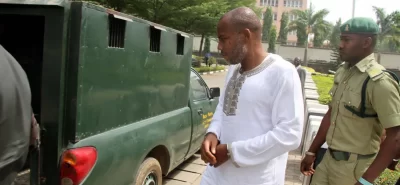Kanu’s Trial, Beginning Of IPOB’s Death – Presidency
The Presidency Sunday faulted the verdict of a London-based news magazine, The Economist, on challenges of insecurity across the country.
A presidential spokesman, Garba Shehu, was reacting to an editorial from the news magazine.
Shehu, in a statement titled ‘Economist’s Flawed, Anti-Nigeria Cover: President Buhari is Strengthening Africa’s Democracy’, said the arrest and ongoing trial of the leader of the outlawed Indigenous People of Biafra (IPOB) which he stressed the Economist rightly described as “delusional” was the beginning of IPOB’s demise.
He disclosed that the present administration was redoubling efforts to have IPOB rightfully designated as a terrorist group by its allies outside of Nigeria, saying “it’s an act which will collapse their ability to transact gains from crime and extortion in foreign currencies.”
He said the IPOB’s aggression and widespread presence on social media “does not reflect their public support for which they have none: all elected governors, all elected politicians and all elected state assemblies in the South-East – which IPOB claim to be part of their fantasy kingdom – reject them completely.”
Shehu said resilience and fortitude of patriotic Nigerians would see the nation through the difficult times.
The Economist in its editorial on October 23, had scored the government of President Muhammadu Buhari low, saying his “inept and heavy handed” administration had failed to tackle corruption.”
Shehu said the Economist was correct that Nigeria faced multiple threats but that “they confluence now not because of this government; but on the contrary, it’s this government which is addressing them concurrently, and simultaneously – when no other prior administration sought to adequately address even a single one.
“While this has been simmering for generations, it’s the newest of the organized threats Nigeria faces to her stability. But this too The Economist inaccurately described: ‘bandits’ who have the resources and technology to shoot down a military fighter jet are not bandits at all – but rather highly organised crime syndicates with huge resources and weaponry.
“Yet, they’re essentially no different to Boko Haram in this regard who are now cornered. It’ll take time, but the president is unwavering in his determination to collapse this challenge to public order.”
Shehu said: “The federal ranches programme, launched shortly after the president’s re-election is the first of its kind – and it’s working: during the last 12 months clashes have significantly reduced.
“The government now calls on state governors to have the imagination to join forces with the federal administration and expand this programme by making available state lands for those interested, now that its effectiveness has been demonstrated.”
Shehu added: “The Economist is correct: Nigeria faces four key threats to the stability and prosperity of the nation – namely: ISWAP/Boko Haram terrorism in the North-East; kidnapping and crime in the North-West; herder-farmer disputes in the central belt; and the delusions of IPOB terrorists in the South-East.
“The Economist is also accurate to state that they’ve come to a head under President Buhari and the All Progressives Congress administration. Yet they do so, because for so long, under previous administrations, whether military or democratic, tough decisions have been ducked, and challenges never fully met – with the effect of abetting these dangers and allowing them all to fester and grow.
“Today, all four threats are being fought concurrently and it’s only this president’s administration which has finally had the will and determination to confront them.” (Daily Trust)


